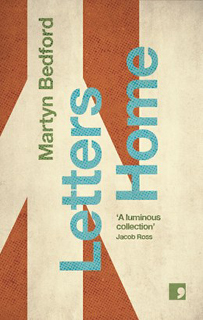
('Our House In The Middle...' © Stephen Bowler, 2014)
THE THINGS WE LEAVE UNSAID: LETTERS HOME
by HANNAH RADCLIFFE
I find something profoundly comforting in recognising a semblance of my own life in the writing of others. As a northerner who has lived in the south of the UK for many years now, I find reading stories firmly bedded in a northern culture to be the literary equivalent of slipping on a favourite pair of slippers; shaped exactly to fit you, at once comforting and familiar. Perhaps I’m being a bit sentimental here, but forgive me. I’m currently homesick for the North – and therefore when reading Letters Home by Martyn Bedford I found it quite wonderful to walk the streets of Ilkley with the protagonist of ‘The Beckhams are in Betty’s’, and hugely evocative to sit in the café at Manchester Oxford Road Station with Louisa in ‘Waiting at the Pumpkin.’
 Aside from my own sentimentality, author Martyn Bedford has described this collection as a group of characters ‘…struggling to bridge the gap between life as it is and life as they might wish it to be.’ Struggling with the idea of what is home, the nature of identity, the need to escape from one life to something different. One might say they are characters who are at a point of redefinition: a man facing down the ghosts of his past at his father’s funeral; an asylum seeker in an alien country trying to piece together a new life far away from his family; a young woman slipping further and further away from reality in a seemingly self-induced coma; a teenage drug-smuggler perilously ill in a foreign land.
Aside from my own sentimentality, author Martyn Bedford has described this collection as a group of characters ‘…struggling to bridge the gap between life as it is and life as they might wish it to be.’ Struggling with the idea of what is home, the nature of identity, the need to escape from one life to something different. One might say they are characters who are at a point of redefinition: a man facing down the ghosts of his past at his father’s funeral; an asylum seeker in an alien country trying to piece together a new life far away from his family; a young woman slipping further and further away from reality in a seemingly self-induced coma; a teenage drug-smuggler perilously ill in a foreign land.
In the story ‘In Anticipation of the Queen’, an accidental encounter illuminates the vulnerability and isolation of two neighbours, strangers to each other despite their lives only being separated by a single wall. It’s Christmas Day and widower, Terence, is planning to sit down to watch the Queen’s speech with a turkey dinner ready meal for one, when Monica, his heavily pregnant neighbour, appears outside his window in distress. Terence invites Monica in from the cold and for a few minutes we witness an encounter that provides brief respite from their two slightly lonely worlds:
“Would you care for a sherry?”
“Can’t drink, either.”
“How about an empty glass?”
She reciprocated his smile, covered her mouth, then the smile expanded into a laugh. “Yeah, why not. An empty glass of sherry would be lovely.”
On the other side of the wall is Monica’s unseen boyfriend Judd, whose erratic crashing and banging carries a weight of tension into the story:
“It releases his frustration,” Monica said. “He works right at the edge, you know.”
“A safety valve?”
“Exactly.”
As reader we are left wondering what kind of life Monica is leading on the other side of the wall. Is she safe? Does her fragility stem from the stresses of being heavily pregnant, or is there something darker at play? We sense this concern in Terence too – “You could watch the Queen here, with me, if you like.’’ And in this offer, we catch a fleeting glimpse of the emptiness of Terence’s life: elderly, widowed, with no immediate family for company. He articulates the chasm that his wife’s death has left in his life in one short exchange with his neighbour:
“We were married for forty-six years.”
“I can’t imagine being together that long.”
“It doesn’t seem that long to me now,” Terence said. “It seems like five minutes.”
And then, just when you think that perhaps these characters might find some solace in each other’s company, Monica is gone. Back to her life and complicated relationship beyond the wall.
I think what I found most poignant when reading this collection were the things that were not spoken between characters; the words that fall between the cracks. Time and time again, characters seem to slip past one another, their true intentions never quite vocalised. This sense of things not spoken is never more powerful than in ‘Unsaid’ – which is less of a story than it is a conversation, between father, daughter and sometimes doctor, as an ageing man moves from a decline in health towards death. In this story, Bedford turns the idea of the linear narrative on its head, starting at the point of death and working backwards to the moment at which the first suggestion of decline begins. This stark exposure of the sad journey through illness, and the emotional juggle between father and daughter that accompanies it, is perfectly executed through the simplicity of the narrative.
“What happened to that old boy in the bed opposite?”
“What do you think happened to him?”
…
…
“It’s lovely out there today.”
…
“Charles sends his love. And the girls.”
…
…
“His daughter was in earlier. Emptying out his cabinet.”
…
…
“I’ll top up your water, will I?”
Martyn Bedford manages to capture with such clarity the enormity of the situation, whilst at the same time paring back the conversation to its rawest form:
“What times is it?”
“I don’t know. Late.”
“I’m so fucking tired.”
“Sleep, then. I’ll sit here while you sleep.”
…
…
“Go home, Est.”
“I’m not going anywhere.”
“I don’t fucking want you here.”
 Through this simply curated conversation, we as reader are given an almost fly-on-the-wall point of view of the mundane indignity of death. It’s both powerful and emotive. And somewhat humbling. And although Bedford refuses to shy away from challenging themes, there are glimmers of observational humour to be found too. Not least, the satisfying retaliation of a beleaguered worker against her bullish boss in ‘Waiting at the Pumpkin.’ And perhaps my personal favourite – the almost obsessional need of the main character of ‘The Beckhams are in Betty’s’ to secure a sighting of the celebrity family in his home town:
Through this simply curated conversation, we as reader are given an almost fly-on-the-wall point of view of the mundane indignity of death. It’s both powerful and emotive. And somewhat humbling. And although Bedford refuses to shy away from challenging themes, there are glimmers of observational humour to be found too. Not least, the satisfying retaliation of a beleaguered worker against her bullish boss in ‘Waiting at the Pumpkin.’ And perhaps my personal favourite – the almost obsessional need of the main character of ‘The Beckhams are in Betty’s’ to secure a sighting of the celebrity family in his home town:
I could say I acted out of character; but I did what I did- so surely it must have been in character? Not typical or predictable, perhaps, but self-evidently within the range of behaviour of which I am capable. I should be careful not to over-dramatise. We’re not talking a Mark Chapman-John Lennon scenario. It isn’t that kind of story.
In this story, our protagonist goes to greater and greater lengths to try and confirm the rumour that the Beckhams are having afternoon tea in the Ilkley branch of Betty’s tearoom:
Scouting round for solutions, my gaze alighted on the recycling bins beside the public toilets. Just long enough for me to dismiss the idea as ridiculous, it crossed my mind to clamber on to one of them.
Only he finds that, as he’s been scouring the location for a way to spot the celebrity couple, he’s missed them leaving by the front door. A futile episode.
Overall, this collection feels to me like a group of stories about tipping points: a man facing a final illness, a woman close to giving birth in a potentially abusive relationship, a son attending his father’s funeral and allowing an old grudge to travel to the surface once more. Perhaps I found such resonance in this collection because of the particular voices explored here: northern voices. Or perhaps it’s because all of us can relate to times at which we have stood on a precipice in our own lives, needing or wanting something – change, validation, a sense of understanding, looking to move beyond our current circumstances to something different, something better. So, perhaps, reading Letters Home was not actually as comforting as slipping into my favourite pair of slippers, after all. Perhaps the reality of it was more challenging than that, more demanding. But then, isn’t the sign of a good book is that it forces you to think? And leaves you thinking, long after you’ve set it down? Martyn Bedford’s characters are reconstructing their own realities, and asking you to do the same.
~
 Hannah has a background in scriptwriting for television and radio, and was twice shortlisted for the Sir Peter Ustinov Scriptwriting Competition. She completed an MA in Creative Writing at the University of Chichester, winning the Kate Betts Memorial Prize. She is in the process of writing a novel and blogs at Mother of Savages.
Hannah has a background in scriptwriting for television and radio, and was twice shortlisted for the Sir Peter Ustinov Scriptwriting Competition. She completed an MA in Creative Writing at the University of Chichester, winning the Kate Betts Memorial Prize. She is in the process of writing a novel and blogs at Mother of Savages.

